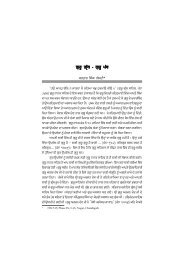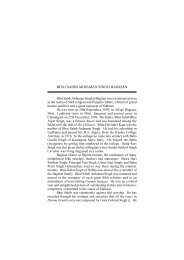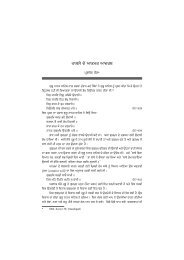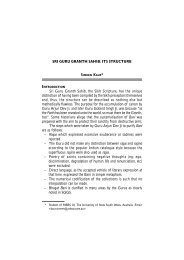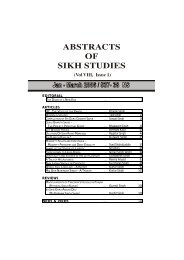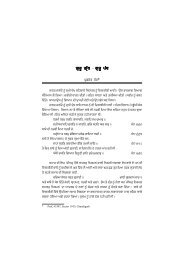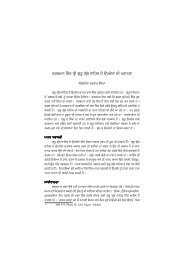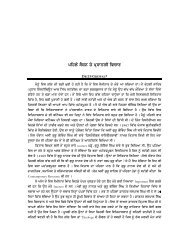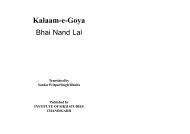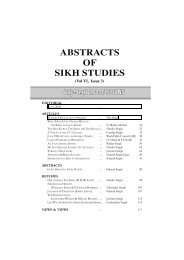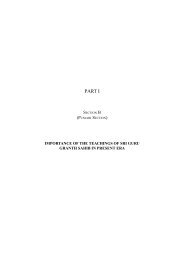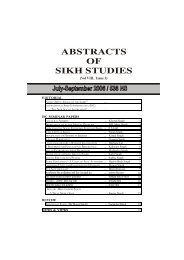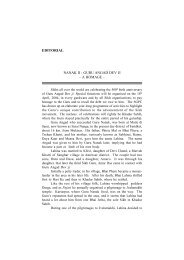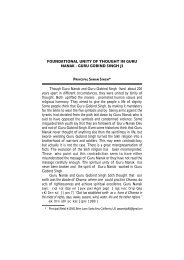editorial articles reviews news & views - Institute of Sikh Studies
editorial articles reviews news & views - Institute of Sikh Studies
editorial articles reviews news & views - Institute of Sikh Studies
You also want an ePaper? Increase the reach of your titles
YUMPU automatically turns print PDFs into web optimized ePapers that Google loves.
80<br />
ABSTRACTS OF SIKH STUDIES : APRIL-JUNE 2005 / 537 NS<br />
century was much more important than the birth <strong>of</strong> either Guru Nanak<br />
or Guru Gobind Singh, and even more significant than the foundation<br />
<strong>of</strong> the Khalsa.” If there was no Guru Nanak, or Guru Gobind Singh,<br />
or the foundation <strong>of</strong> the Khalsa, what was the need for any struggle<br />
or persecution This one statement was more “; than sufficient for the<br />
Toronto University, if it is not a putri-pathshala or a captive organization<br />
<strong>of</strong> McLeod, to refuse Fenech doctorate degree. This is one <strong>of</strong> the<br />
most stupid statements made in the thesis.<br />
Fenech chooses to hang his examination <strong>of</strong> the <strong>Sikh</strong> Gurus (about<br />
50 pages) and the post Guru period (another 10 pages) on these<br />
inter<strong>views</strong>. He goes on to mention that 35 percent <strong>of</strong> those interviewed<br />
mentioned the persecution and martyrdom <strong>of</strong> Guru Arjun or Guru<br />
Tegh Bahadur as the most important event <strong>of</strong> <strong>Sikh</strong> history. It is in this<br />
process that he on the one hand rebuts WH McLeod and J.S. Grewal<br />
that Guru Nanak “left his posterity theology and not a description <strong>of</strong><br />
his period” as “the interpretation <strong>of</strong> political condition in vast majority<br />
<strong>of</strong> texts endures,” and on the other, supports Grewal’s thesis about<br />
minimising the strength <strong>of</strong> the Gurus ‘moral fibre’, because <strong>of</strong> his<br />
moderate language. He talks <strong>of</strong> Guru Nanak’s courage and heroism in<br />
Babur Vani and possession <strong>of</strong> “defiance, resistance, courage and<br />
fearlessness.” He looks to tradition to supply interpretation which<br />
scripture itself cannot supply.<br />
Fenech looks at heroic traditions in <strong>Sikh</strong>ism -the destruction <strong>of</strong><br />
tyranny as Will <strong>of</strong> God,’ and the role <strong>of</strong> Gurmukh who is attuned to<br />
hukam, as an instrument <strong>of</strong> God’. The Gurmukh suffers physically but<br />
not spiritually. He is fearless.<br />
Fenech is now seized <strong>of</strong> McLeodian view and says that despite<br />
Singh Sabha, “a plurality <strong>of</strong>, what he calls ‘tradition’ and as such<br />
interpretation, not necessarily <strong>of</strong> Khalsa, does exist as “we can never<br />
really know what Guru Nanak was thinking as he says his shabads out<br />
to posterity.” In this contest, he mentions Nirmalas and Udasi <strong>Sikh</strong>s as<br />
against the Khalsa <strong>Sikh</strong>s. Fenech brings in the relevance <strong>of</strong> events <strong>of</strong><br />
1984 to interpret the text. He quotes Pr<strong>of</strong>. J.S. Grewal’s Guru Nanak in<br />
History to say that hymns <strong>of</strong> Guru Nanak do not advocate “rebellion”<br />
but only “revolt”. This is frankly beating about the bush as both the



